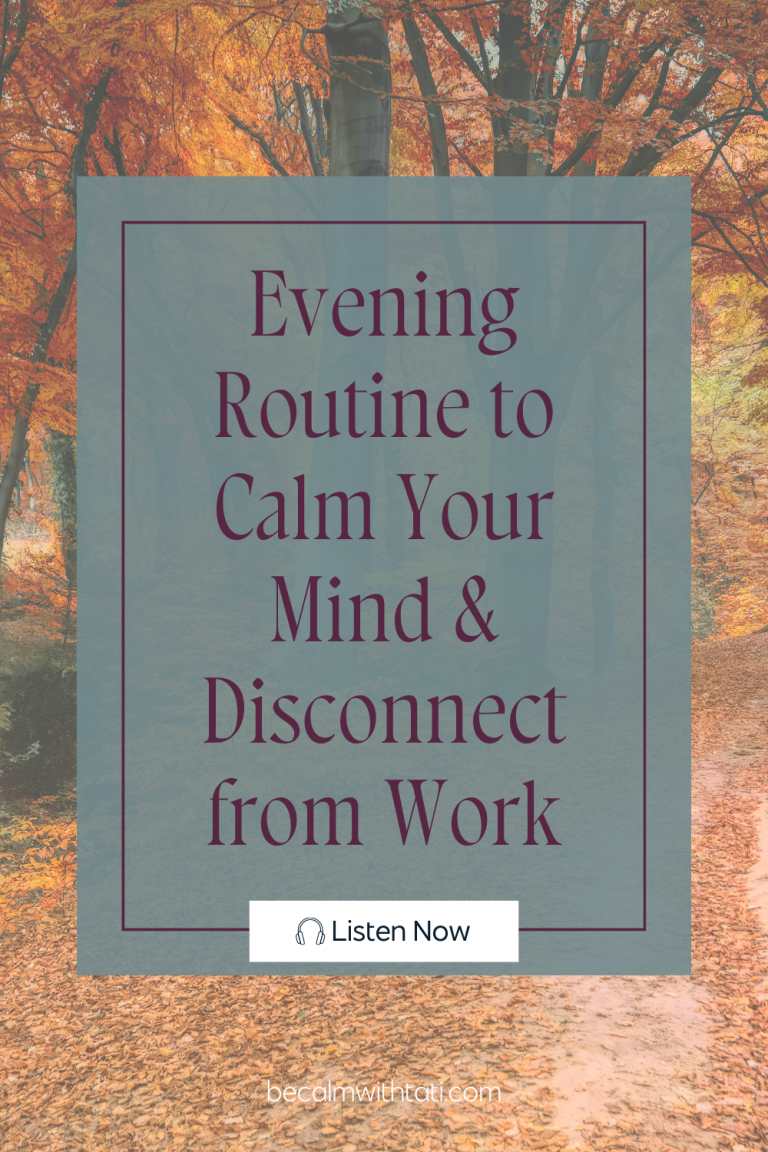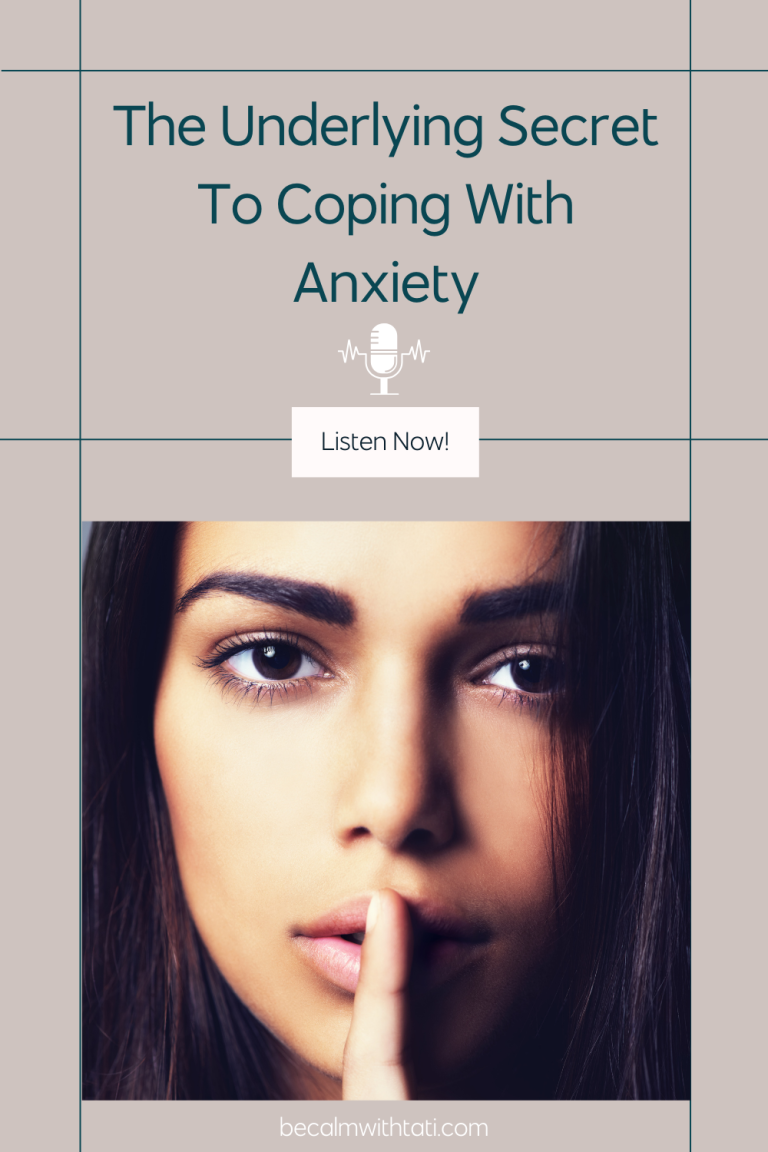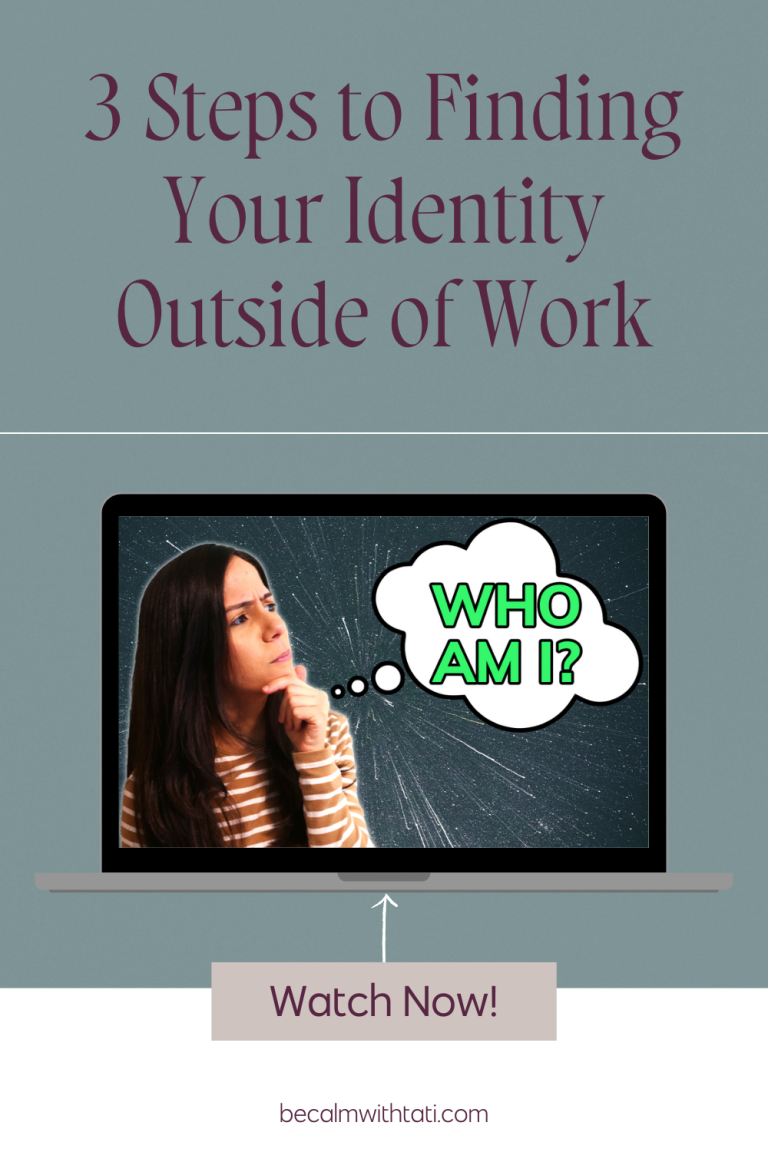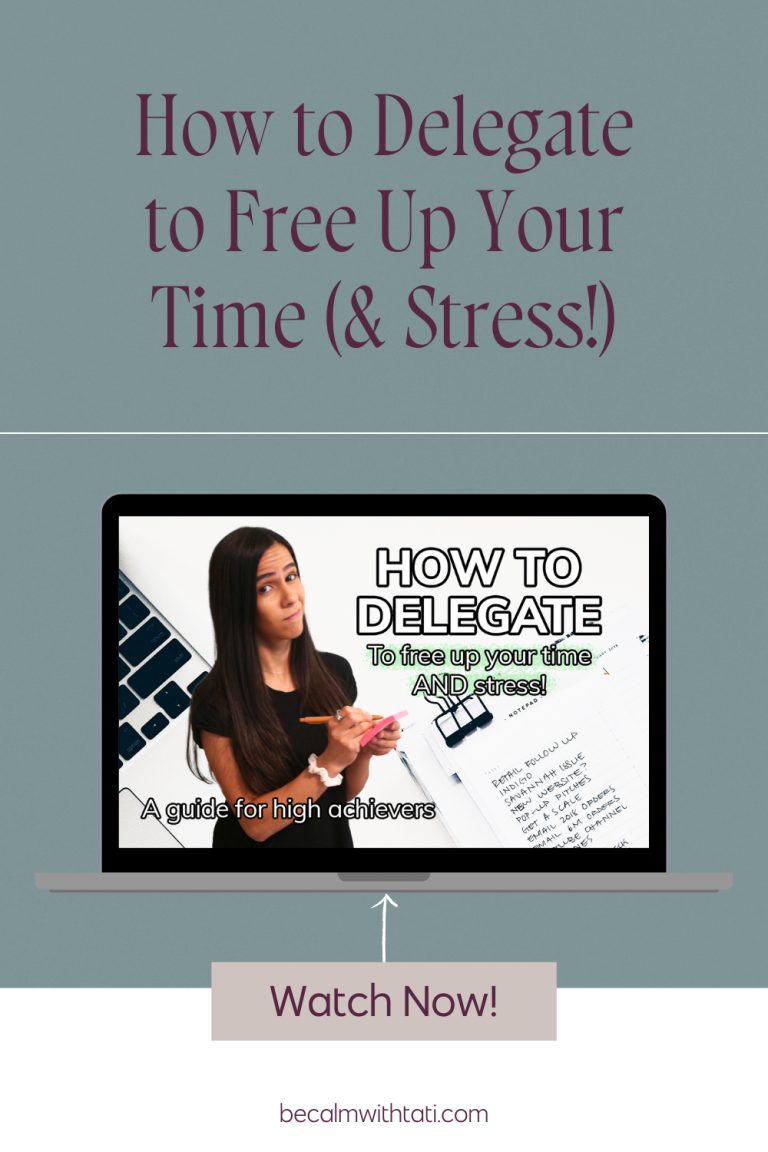Your intuition is the inner voice that just knows, without having to reason consciously. It’s the gut feeling, the sense that you know what decision to make or when something (or someone) just doesn’t feel right. It’s not magic, but a product of your unconscious mind processing past information and experience. But sometimes anxiety can feel like a gut feeling, the fear that “something doesn’t feel right” or “I don’t want to do this thing because I’m afraid” can be easily confused for intuition. In this episode, I’ll be diving into how you can discern your intuition from anxiety so you can listen to your needs and make the best decisions you can in the moment.
In this episode, you will learn:
- The characteristics of anxiety-driven thoughts
- What exactly your intuition is and what you can use it for
- 5 practical tips to help you effectively discern between your anxiety and intuition
My 5 Minute Journaling Trick for Anxiety & Overwhelm: https://www.becalmwithtati.com/journal-for-anxiety/
Source: https://www.psychologytoday.com/us/basics/intuition
LISTEN NOW:
🎧 CLICK HERE TO LISTEN TO CALMLY COPING WHEREVER YOU LISTEN TO PODCASTS
WATCH NOW:
📝 Take the Free High-Functioning Anxiety Quiz: HFA Quiz
🎓 Learn more about The Calm & Ambitious Membership: Membership
🖊️ Join the waitlist for my 1:1 services: Waitlist
💬 Submit a message, question, or suggestion to the podcast: Message
FREE TRAINING: Achieve A Calm Mind, Balanced Life, & Empowered Confidence in 90 Days
If you want to learn how to take back control of your life so you can feel calmer and more confident, and learn the tools to spend your time according to what matters most to you (no matter what your schedule is like right now)…
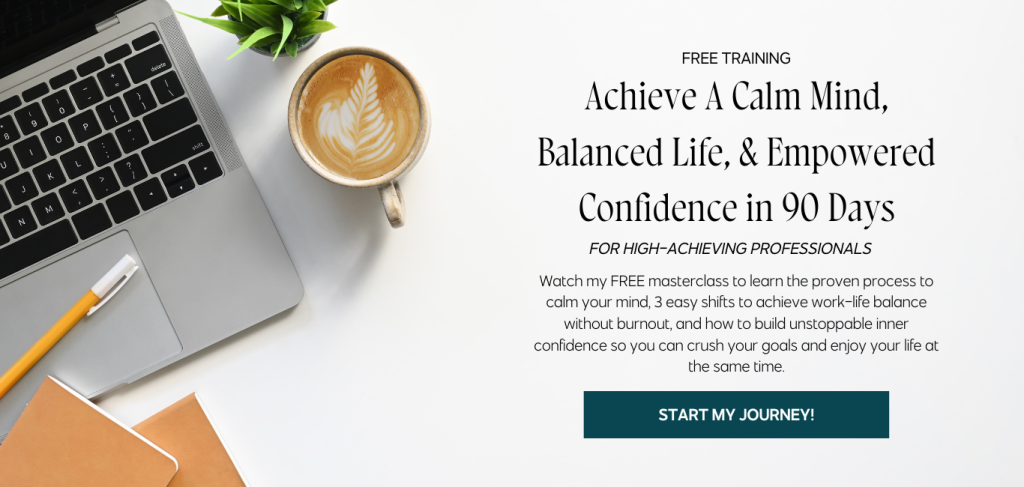
LISTEN, REVIEW, AND SUBSCRIBE TO THE PODCAST!
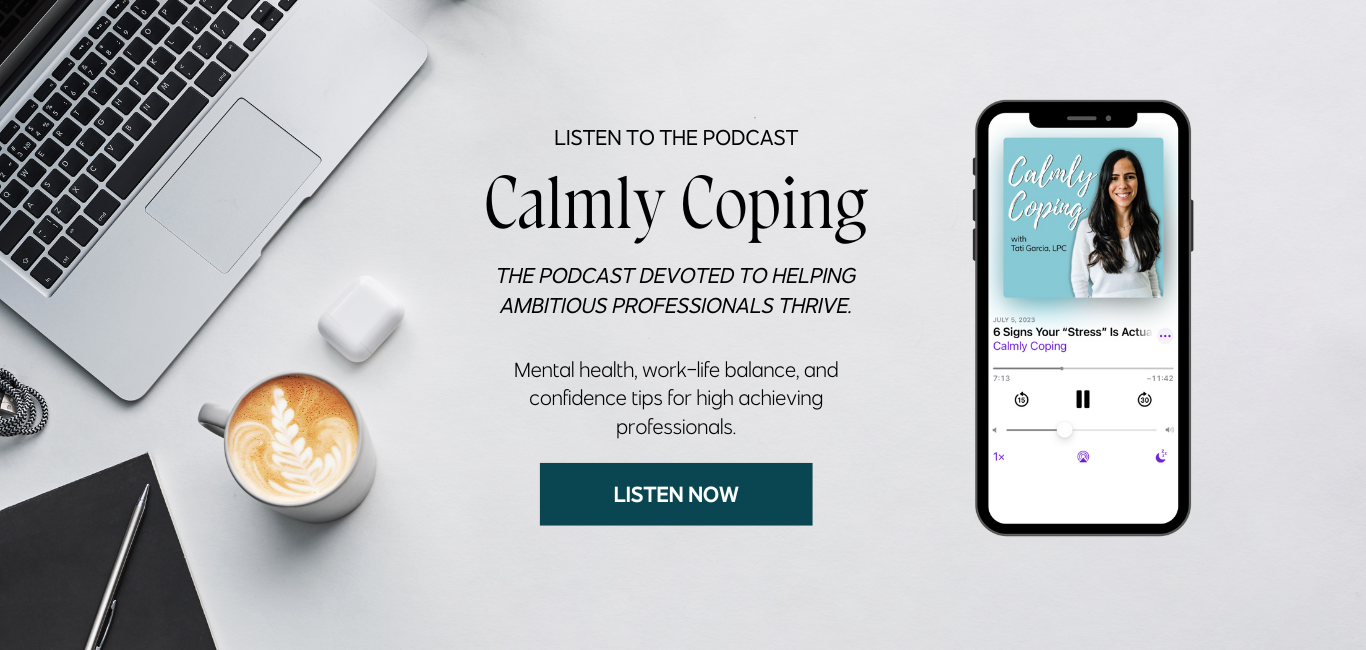
INTRO/OUTRO MUSIC: Rescue Me (Instrumental) by Aussens@iter (c) copyright 2018 Licensed under a Creative Commons Attribution (3.0) license. http://dig.ccmixter.org/files/tobias_weber/57990 Ft: Copperhead
DISCLAIMER: All content here is for informational purposes only. This content does not replace the professional judgment of your own mental health provider. Please consult a licensed mental health professional for all individual questions and issues.
Interested in diving deeper to get support for high-functioning anxiety?
I offer 1:1 coaching to help high-achievers overcoming high-functioning anxiety so they can feel calmer, more present, and have improved balance in their lives. Click here if you’re interested in learning more and getting started.
Calm, Balanced, & Confident is my comprehensive A→Z self-paced course to help high-achieving professionals overcome high-functioning anxiety so they can feel calmer, balanced, and more confident without the anxiety and overwhelm. Click here to learn more and enroll today.
Looking for ongoing support and guidance with high-functioning anxiety? The Calm & Ambitious Community is the exclusive community for high achievers with high-functioning anxiety. Click here to learn more and join us today!
TRANSCRIPT:
Click to view the episode transcript.
Your intuition is the inner voice that just knows without having to reason consciously. It’s the gut feeling, the sense that you know what decision to make or when something or someone just doesn’t feel right. It’s not magic, but a process of your unconscious mind processing past information and experiences.
But sometimes anxiety can feel like a gut feeling. The fear that something doesn’t feel right, or I don’t want to do this thing because I’m afraid. can be easily confused for intuition. In this episode, I’ll be diving into how you can discern your intuition from anxiety so you can listen to your needs and make the best decisions you can in the moment.
Welcome to Calmly Coping. I’m your host, Tati Garcia. I’m a licensed therapist and a high functioning anxiety coach. Calmly Coping is the podcast for people who struggle with anxiety and high functioning anxiety. Each Wednesday, you’ll hear informative episodes with actionable tips about decreasing anxiety, adopting a healthy mindset, and managing your time and energy so you can live a calm and balanced life.
Let’s get started. Thank you so much for tuning in. This was inspired because I have monthly themes for my membership community, the Common Ambitious Community, and the theme for July was cultivating self trust, building that muscle of listening to yourself and your needs, which is something that is super important for the individuals that I help who are high achievers, who tend to struggle with overthinking things, with putting themselves last, and with being People pleasing and difficulty with making decisions and perfectionism and all the things that go along with them.
Cultivating self trust and building the muscle of listening to your intuition is a really powerful antidote to all of those struggles. So first I want to talk about what the difference is between your anxiety driven thoughts and your intuition. First let’s talk about anxiety driven thoughts. So they tend to come from a place of fear and focusing on the worst case scenario in an outcome.
They can be a form of protection in some situations where the fear is warranted. So maybe you’re in a sketchy part of town and you want to keep yourself safe and so you have a sense like, okay, what if somebody’s following me or, you know, I need to be on guard. And anxiety driven thoughts often tend towards avoidance, or in the case of high functioning anxiety, overdoing.
So this can look like overthinking, overworking, overcommitting, overpreparing, etc. And anxiety driven thoughts can be influenced by past behavior, but often tends to skew towards the worst case scenario because our brains like to err on the side of it. of keeping us safe. So even if there is a small chance that something bad could happen and it’s something that is bringing up fear and anxiety for you, then your brain is going to want to keep you away from that thing, even if there could be potential benefits.
And even if your brain is maybe overestimating the likelihood of something bad happening. And it can prevent you from doing things that are ultimately positive. So maybe these are new and unfamiliar opportunities. Maybe it can look like not practicing the proper self care by slowing down and resting because you’re afraid that if you stop or slow down that’s going to mean that you’re dropping the ball.
Or maybe saying yes to a friend or a colleague because you’re afraid of them perceiving you as rude or not wanting to be helpful. If you can resonate with any of these examples I’ve given and you’ve heard me throw around the phrase high functioning anxiety a few times but you’re not sure what it is, I have a free quiz that will guide you through some questions to help you assess and let you know whether or not you could be struggling with high functioning anxiety and also give you some personalized recommended resources afterwards.
You can take this quiz and learn more by going to hfaquiz.com. Here’s the thing, when you avoid things because of anxiety, you actually further reinforce your anxiety and communicate to your brain that this is something I need to be afraid of, even if it’s something that you don’t, and that you actually want to overcome.
And so this can put you in a place where you’re further increasing your anxiety rather than reducing it. And our warning system errs on the side of false alarms, especially when you’re somebody who tends to struggle with anxiety. And I like to refer to this as having a sensitive alarm system. If you’ve ever had a smoke detector that was maybe too close to the kitchen or went off when they’re really you just burned something or there wasn’t any danger, then you know how frustrating it can be to have that sensitive alarm system.
And this is what it can feel like with anxiety. And it can sometimes hold us back more than it helps us to work towards the things that we want. Even with high functioning anxiety, when anxiety is propelling you forward into taking action and being successful and being hardworking, it can oftentimes be at the expense of taking care of yourself.
So that’s when understanding what your intuition sounds like and feels like is really valuable. So intuition, this is a quote from an article on psychology today, psychologists believe that intuition relies on powers of pattern matching as the mind combs experience stored in long term memory for similar situations and presents in the moment judgments based on that experience.
based on them. It’s an automatic processing of unconscious information that’s happening without you even realizing it, of course, because it’s unconscious. And it can be a physical sensation. If you’ve ever heard people refer to it as a gut feeling or this inner knowing, whatever it feels like for you in your body, it can be something that is very physical and very somatic.
And it can also take time to come to intuitive responses. It’s not something that’s always immediate, like I know exactly what this is. It could take time, maybe, you know, sometimes overnight, this can happen to me. My brain processes things overnight and I can come to a realization in the middle of the night or the next day of something that was stumping me the day previous.
That can be an example of your intuition coming to a decision. Now, when I say intuition, it sounds like this thing that is an enigma, maybe even outside of you, but ultimately it’s coming from these processes that your mind automatically does. You can certainly hone the muscle of intuition and learn how to better listen to your needs.
It can be used in situations to determine when maybe it’s time to push forward and work harder, to follow through with a choice, to take a step back and rest, or anything that’s an important decision or even a small decision in your life. So for example, right now I am in a phase where I am letting go of the throttle and not pushing as hard as I was, especially in the first few years of my business.
My intuition that inner gut feeling is kind of telling me that it’s time to take a step back and it doesn’t mean that I’m dropping the ball. It’s just that when I feel like, when I have the tendency to push forward and do more, it’s kind of like my body is screaming, no. And you know, I’ve set certain boundaries for myself and learned to distinguish what that looks and sounds like and how, just essentially how that.
feels for me. I have become much better at tuning into what these signals look like and feel like for me. And this is something that you can do for yourself. And it’s not to say that we’re always going to be able to listen to our intuition 100 percent of the time, because sometimes we have to do things that we don’t want to do or that feel uncomfortable.
And that’s okay. But it’s just about learning in the situations where you can, you do have agency, you do have the ability to make choices and say no or do something different. It can be really powerful to help you to hone that muscle and build that skill. And here’s the thing. It’s not an exact science.
It’s very subjective because it’s coming from you. It’s coming from your personal opinions. It’s coming from your past experiences and that’s okay. It’s about listening to yourself and discerning what you want to do with that information. So now let’s talk about specific tools that you can use to cultivate self trust and distinguish intuition from anxiety.
So first, if you want to discern anxiety, asking yourself, is this based on evidence or is this based on fear? When we’re looking at evidence, okay, are there actual facts to support what my mind is telling me? Or is it really that my mind is blowing this out of proportion because of fear? And notice what anxiety feels like in your body.
It can feel different for everybody, but oftentimes it feels like your heart beating quickly, tension in your body. It can feel like shallow breaths. It can feel like maybe physical discomfort, maybe digestive issues or pain in your body. So determining what anxiety feels like for you can help you get a sense of, is this anxiety or is this something else?
And of course, there’s different levels of anxiety. There could be the more mild anxiety that’s not necessarily you’re really unable to focus or think about anything else, but more just kind of that low background sense of anxiety that you might be feeling. And here’s the thing, anxiety, like I mentioned before, is focused on the worst case scenario and keeping yourself safe and often on negative thoughts.
And anxiety can sometimes conflict with intuition, but Because anxiety, a lot of times feels louder. It feels like it’s more important in our minds because it’s that alarm system trying to keep us safe. It can be hard to see. So for example, let’s say if you have a fear of public speaking, but maybe a desire to share your message.
And this is something that really feels like a passion for you or a mission that you have. This can conflict with the anxiety you have about public speaking. And so determining, um, All right, how important is this desire to share my message and what can I do to work on facing this fear so that you can follow your intuition in that situation while also reducing the anxiety?
Because ultimately facing our fears is what helps to reduce anxiety. Another practice, and this is something that I often use with clients, is to get a sense of what intuition feels like in your body. So if this feels safe for you to do this right now, you can do it now. Or if you’re driving or doing something else, you can do this at a later time.
But essentially, you can take a few deep breaths and close your eyes. Again, only if it feels safe to do so. And say something either out loud or silently to yourself that you know you really dislike or disagree with. So anything that stands out for you. So maybe it’s a food you don’t like or an opinion that you disagree with or whatever it is.
And just notice how that feels in your body. So for me, it’s oftentimes like a tightening in my chest and a tension and kind of like wanting to like curl up into a ball Sometimes and it might be different for you, but this can give you a sense of okay What does a no feel like in your body and then we can do the opposite.
So again kind of re centering Taking some deep breaths closing your eyes And then asking yourself, what is something that you really like, are excited for, agree with, and how does that feel in your body? And again, this can feel different. For me, sometimes it’s kind of this lightening, this opening up, and this can give you a sense of what a yes feels like in your body.
And of course, there’s always going to be differing degrees, and this is just a general view so that you can connect more with what your body already knows, but that you may not be aware of. And here’s the thing, intuition, because it’s called a gut feeling, that’s because it’s often experienced in the body.
It’s something that we can connect with, but in our very cerebral lives and worlds, we’ve often disconnected from feeling what we feel in our body. So that can give you a starting ground for intuition. Making small decisions and taking it from there and that’s my next tip is to start with making small decisions Don’t start with huge life changing ones and trying to ask yourself, you know, do I want a new job?
But maybe starting with what do I want to eat today? And what can also be helpful to connect with your intuition is to engage in practices that increase your level of self awareness. This can look like meditation, journaling, yoga, therapy, anything that helps you to become more aware of your inner world of what’s going on inside.
And it’s so important to be patient when it comes to this. This isn’t an overnight thing that’s just going to happen immediately. This is something that is cultivated over time and something that you can practice as you start to get to know yourself better and as you start to listen to these signals more.
And it can also be confusing sometimes. Don’t try to overthink it, even though that may be your tendency. Don’t try to say, well, I really need to know. What this is, what this answer is right now, because sometimes when you try to force things, you’re actually stepping further away from getting to that inner voice, that intuition, that gut feeling, and you’re diving more into pushing yourself and creating more potential resistance, which is going to get you away from that.
that inner knowing, which is something that one way to think about it is you allow that feeling to come. You notice what’s already there rather than trying to force something to show up. Hopefully that distinction makes sense. And it wasn’t always easy for me even though I mentioned that I have honed this muscle.
It’s something that took me a while to get here of learning how to listen to myself. and learning how to listen to these signs and signals that my body was giving me. And of course, intuition, like I mentioned before, it’s not something that’s a perfect science, but it’s also not something that’s magical.
I mean, I think that people can have spiritual beliefs when it comes to that, and that is perfectly fine. However, there can also be those scientific explanations that it is coming from what our bodies have evolved to do, which is look out for our needs. So I hope these tips were helpful for you and this explanation about the difference between anxiety and intuition and how to hone these skills.
If you’re interested in one to one support on reducing anxiety and increasing your intuition, then you can join the waitlist to work with me by going to calmlycoping.com/waitlist and I will let you know as soon as I have openings for either coaching or therapy, depending upon what you’re interested in and where you’re located.
Currently I am licensed in New Jersey and Pennsylvania to provide therapy, but I can provide coaching to anybody globally. And let’s continue the conversation. If you’re watching on YouTube or listening on Spotify, let me know in the comments, how do you know the difference between anxiety and intuition?
While you wait for next week’s episode, I have other episodes about calming your mind, improving work life balance, and feeling more confident from within. Thank you so much for tuning in today, and until next time, be calm. Thanks so much for listening. If you like what you heard, please share this episode with a friend.
And please subscribe and leave me a review on iTunes. Also, remember to check me out online at CalmlyCoping. com and connect with me on Instagram at TatianaGLPC. All content here is for informational purposes only. This content does not replace the professional judgment of your own mental health provider.
Please consult a licensed mental health professional for all individual questions and issues. Till next time, I’m Tati, and this has been Calmly Coping.


Until next time…




